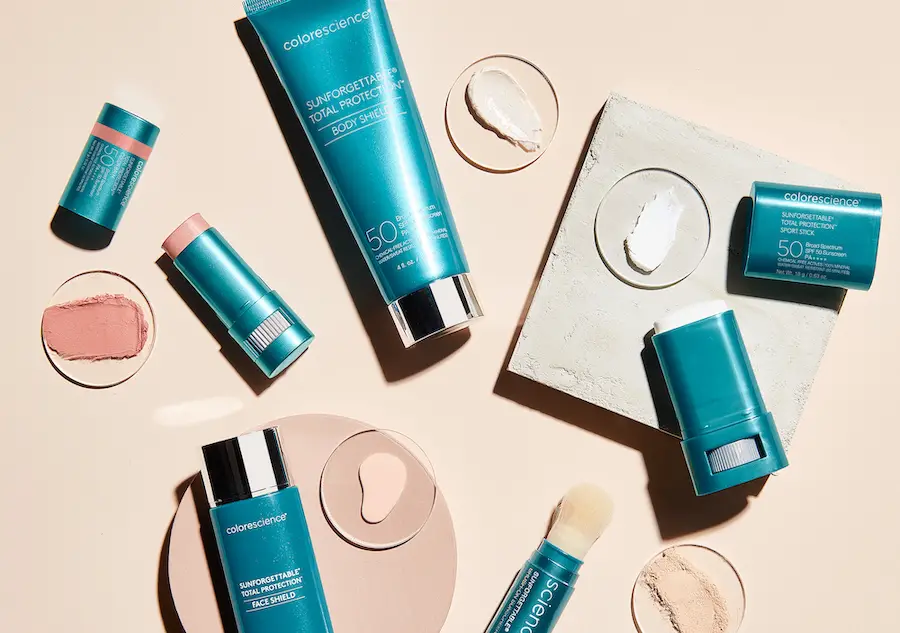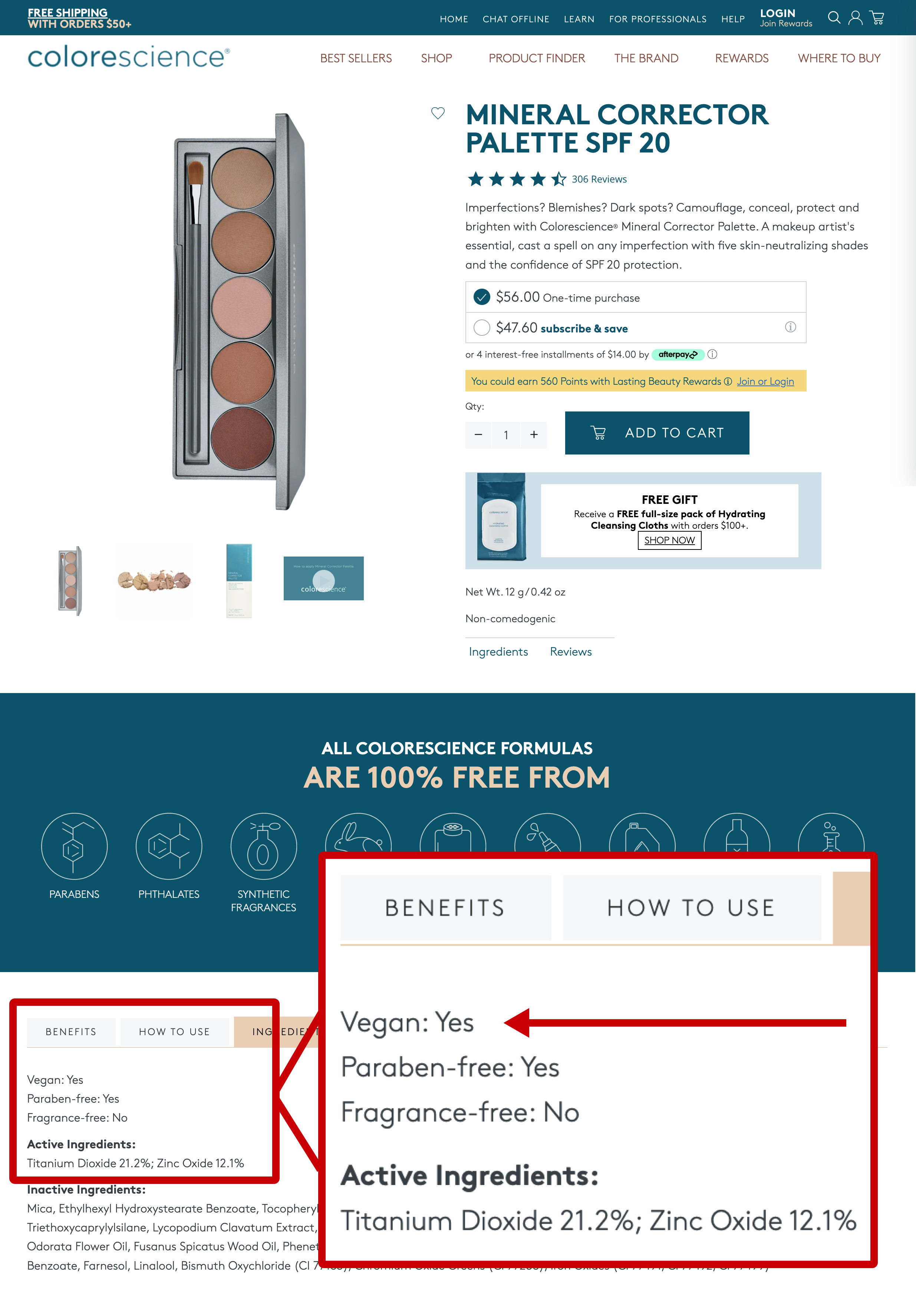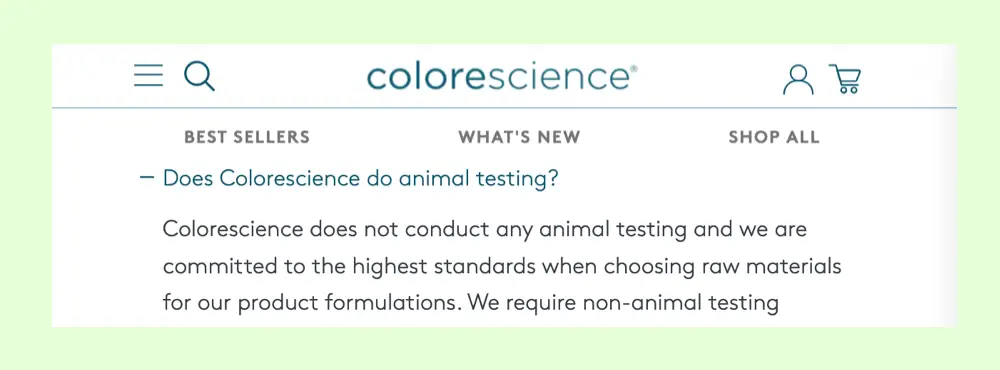We know Colorescience leads by example in the sun care industry. But we’re concerned about its cruelty-free, vegan, and sustainability practices. Are they behind the times?
Colorescience is cruelty-free. It doesn't conduct animal testing on its products, nor does it distribute its cosmetics where animal testing is required by law. While Colorescience does offer a range of vegan cosmetics, it is not considered a vegan brand.
We’re here to help you understand who you are supporting by looking into Colorescience’s animal testing policies and its cruelty-free and vegan status.
We then look at how safe the brand's ingredient choices are and what to avoid. You’ll also decide whether you can confidently spend your money knowing animal welfare and the environment are considered too.
Ultimately, you'll know whether to click "add to cart" for your next Colorescience purchase or if you need to fill out a feedback form with the words, "we think you can do better."
Is Colorescience Cruelty-Free and Vegan?
Colorescience is Cruelty-Free
Test any of its products or ingredients on animals
NO
Purchase any ingredients tested on animals within its supply chain
No
Distribute its products to any countries that require animal testing by law.
yes
Colorescience refuses to sell in regions where animal testing is a legal requirement.
They are proud to be cruelty-free BUT have no accreditation to show for it – why?
On the bright side, Colorescience is privately owned and has never been associated with animal testing.
This brings us to our next point:
Colorescience is Not Vegan
All Colorescience SPF products are certified vegan.
But it still uses some animal-derived ingredients in its other ranges.
Luckily, the brand marks all of its vegan items on its website. Once you’ve made your product selection, you’ll be able to find this information here:
The only three animal-derived ingredients that Colorescience uses are:
If you're interested in which products are vegan or finding vegan brand alternatives – keep reading or click on this link: Colorescience vegan products.
Animal Testing Policy and History
Colorescience claims to have been committed to creating clean, effective, and sun-safe cosmetics that are also cruelty-free since it was founded.
Cruelty-Free Status in 2022
Here is a screenshot of Colorescience’s official statement regarding its cruelty-free policies and vegan products, taken from its website:
Certification
Colorescience has no cruelty-free certification.
As a brand with over $86,2 million in funding, it could easily be certified. Colorescience claims to make “cruelty-free products” without any backing – we have to ask ourselves why?
Ideally, all brands that consider themselves cruelty-free should be Leaping Bunny certified.
While you might know PETA very well – it surprisingly doesn't hold the strictest cruelty-free regulations. Leaping Bunny certification is the ideal global standard.
Is Colorescience Sold Where Animal Testing is Required By Law?
Colorescience does not distribute any of its products to China or any country that requires animal testing on cosmetics by law.
China has a shocking track record. It is the country with the most animal testing globally, with over 20 million animals used per year.
However, if you live in China or are concerned about its cruel beauty policies, there are a couple of loopholes.
Here's how to find cruelty-free cosmetics in China: Are Cosmetics Made in China Cruelty-Free?
What Colorescience Products Are Vegan?
If you’re looking for anything with an SPF from Colorescience – we guarantee it’s vegan.
But if you want to save some time searching for its best vegan options, we can help! Here’s what we recommend:
You can find a complete list of Colorescience’s vegan products on its website.
Vegan Alternatives to Colorescience
We wouldn’t dismiss Colorescience as an option too quickly.
But, if you’re a die-hard vegan, you might not feel comfortable supporting a brand that has non-vegan (and non-vegetarian) options.
If this is you – here are some alternatives to consider:
Brand | price range | 100% vegan | Certification |
|---|---|---|---|
$20 - $50 | Yes | PETA | |
$20 - $40 | No, vegan- friendly | PETA | |
$5 - $20 | Yes | PETA, Leaping Bunny | |
$30 - $50 | Yes | None | |
$15 - $30 | Yes | PETA | |
$25 - $80 | Yes | Leaping Bunny |
Is Colorescience Natural and Organic?
Colorescience uses a high amount of natural ingredients but is more focused on being non-irritating than natural.
It claims to only use natural botanicals, minerals, and antioxidants in each product and no chemical sun protection.
Although Colorescience might use some organic ingredients, it is not certified organic, nor does it advertise itself as an organic brand.
Clean vs. Natural Ingredients
The term "natural" is not regulated for cosmetics and skincare. In other words, it doesn't hold one specific meaning.
Usually, it means a product is free of more toxic synthetic ingredients, including parabens, phthalates, sulfates, and more. But people also interpret "natural" to mean ingredients of immediate plant origin.
Here's the thing: "natural" is not necessarily good. Just because an ingredient is natural (take olive oil, for example) doesn't mean you should rub it on your skin and sit in the sun so you fry like a chicken breast!
All products use a certain amount of synthetic ingredients in their formulas. Colorescience is no exception – but it does choose to use better or clean synthetics.
If a synthetic ingredient is "clean," it means it is safe and non-toxic for us. Its purpose is to preserve the stability of a beauty formulation.
Does Colorescience Use Safe Ingredients?
According to Skin Safe, Colorescience has an 82- 100% allergen-free ranking across 72 products.
All Colorescience products are free from parabens, phthalates, synthetic fragrances, animal testing, talc, dyes, mineral oils, drying alcohols & chemical sunscreen
Although Colorescience is not 100% hypoallergenic and non-comedogenic, they cater to that market, so check your labels carefully.
The EU/UK Have Stricter Ingredient Regulations
We don’t want to scare you, but you HAVE to read up on any product’s ingredient list before you make a purchase – especially if you live within the United States. The reason why will shock you.
The FDA has only banned or restricted 11 harmful chemicals from cosmetics within the country. Europe and the UK, on the other hand, have banned 1,328!
Luckily, Colorescience sets a great example of what true clean beauty is meant to be. You shouldn’t worry about any serious hidden nasties in its products.
But it’s worth knowing which sun care ingredients to avoid in general:
With skincare and cosmetics, stay clear of the following:
Are Cruelty-Free Ingredients Safe?
There is no reason why cruelty-free products shouldn’t be as safe as anything tested on animals.
Not only is it easy to test ingredients without using animals altogether, but there are so many pre-approved ingredients you can use to make cosmetics that there is no need.
If you’re interested, here’s more on the subject: Are Cruelty-Free Cosmetics Safe?
Is Colorescience Sustainable and Ethical?
Colorescience does not claim to be a sustainable company or have social initiatives that align with the company values.
What we do know is that the brand:
But that’s where the magic stops.
Colorescience does not market itself as environmentally friendly at all (which is kinda embarrassing to be this complacent in 2022).
We’d love to see Colorescience work on some initiatives like:
Final Thoughts
Colorescience has a considerable fan base, and apparently, this stuff works incredibly well. Just look at the rave reviews and results from the studies they fund.
The fact that they claim to be cruelty-free is a step towards a more sustainable future in cosmetics.
We appreciate that it has a transparent supply chain and is open to the public about its testing, purchasing, and distribution policies.
However, considering more ethical factors could turn this brand into a powerhouse.
Since Colorescience is not 100% vegan or vegetarian – it might not be the best choice for activists who go the extra mile. Especially since the brand uses palm oil, mica and unsustainable packaging.
Finally, it would be nice to see any cruelty-free accreditation from reputable organizations. So, let's push to make that happen!



